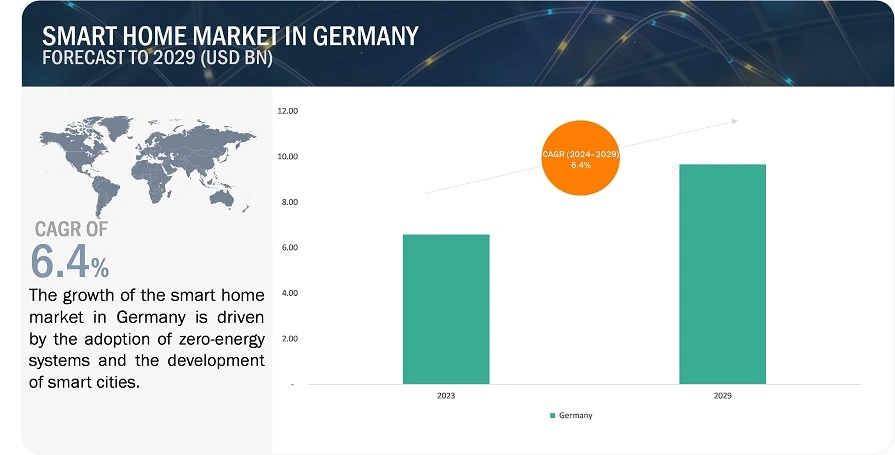Smart Home Market in the Germany
According to MarketsandMarkets, the smart home market in Germany is expected to grow from 6.58 billion in 2024 to 9.66 billion in 2029, at a CAGR of 6.4% from 2024 to 2029.
Germany has emerged as a key market in the global smart home market, with its blend of technological advancements, environmental consciousness, and increasing consumer demand for convenience driving the sector forward. The country's commitment to innovation and sustainability is reflected in the rising adoption of smart home technologies among its population.
Germany’s strong emphasis on sustainability is a significant influence on its smart home market. With government initiatives aimed at reducing carbon emissions and promoting renewable energy, smart home solutions are increasingly designed to align with these goals. Devices like smart thermostats, energy-efficient lighting solutions, and intelligent water management systems are becoming staples in German households. Smart home solutions in Germany not only contribute to energy conservation but also support households in reducing utility costs. For instance, smart heating systems adjust room temperatures based on real-time occupancy, significantly cutting down energy wastage.
Focus on Sustainability
Germany’s strong emphasis on sustainability is a significant influence on its smart home market. With government initiatives aimed at reducing carbon emissions and promoting renewable energy, smart home solutions are increasingly designed to align with these goals. Devices like smart thermostats, energy-efficient lighting, and intelligent water management systems are becoming staples in German households. Smart home solutions in Germany not only contribute to energy conservation but also support households in reducing utility costs. For instance, smart heating systems adjust room temperatures based on real-time occupancy, significantly cutting down energy wastage.

Consumer Trends and Preferences
German consumers show a strong preference for quality, reliability, and security in their smart home devices. Privacy concerns are a key consideration, given the country's stringent data protection laws. As a result, smart home providers must prioritize robust cybersecurity features and transparent data policies to gain consumer trust. Voice-controlled devices like Amazon Echo, Google Nest, and Apple's HomeKit are gaining popularity in German homes. However, there is also a growing demand for locally-developed solutions that cater to German language preferences and cultural nuances. Another emerging trend is the use of AI-driven technologies in home automation. Features such as predictive maintenance, voice personalization, and AI-powered learning systems that adapt to user behavior are becoming standard offerings.
The Road Ahead for Smart Home in Germany
The future of smart homes in Germany looks promising as technology becomes more affordable and user-friendly. With the advent of 5G networks and further advancements in IoT, the integration of smart home devices into everyday life will become even more seamless.
As Germany continues to lead the charge in sustainability, smart homes will play a pivotal role in achieving energy efficiency and carbon neutrality. This shift not only aligns with the country's green initiatives but also creates opportunities for businesses to innovate and cater to an environmentally-conscious market.
AI integration with Smart Home in Germany
Artificial Intelligence (AI) is profoundly transforming the smart home landscape in Germany, enhancing efficiency, personalization, and sustainability. AI-driven systems, such as predictive learning algorithms, enable devices to adapt to user preferences and habits, creating highly personalized and intuitive living experiences. As Germany prioritizes data privacy and regulatory compliance, AI in smart homes is evolving to incorporate robust encryption and secure data handling practices, ensuring user trust in a rapidly digitizing domestic environment. According to a study by Bitkom (Germany), in 2023 ~46% of households in Germany have adopted smart home applications. With ~80% of Germans express openness to AI-controlled smart home tools. Most envision AI enhancing heating systems (~70%) and proactively managing maintenance (~51%).
Challenges in the Market
Despite its growth, the German smart home market faces challenges. High initial costs for smart home installation deter some potential users, especially in the middle-income segment. Additionally, the complexity of setting up and managing multiple devices can overwhelm consumers who are not tech-savvy. Interoperability among devices is another hurdle. With a plethora of brands and protocols, ensuring seamless communication between devices remains a challenge for both consumers and manufacturers.
Related Report
Smart Home Market Size, Share & Trends by Product (Lighting Controls, Smart Speaker, Entertainment, Smart Kitchen, HVAC Controls, Security & Access Controls), Offering (Behavioral, Proactive), Sales Channel, Installation Type and Region - Global Forecast to 2029
Contact:
Mr. Rohan Salgarkar
MarketsandMarkets™ INC.
1615 South Congress Ave.
Suite 103
Delray Beach, FL 33445
USA : 1-888-600-6441
sales@marketsandmarkets.com
This FREE sample includes market data points, ranging from trend analyses to market estimates & forecasts. See for yourself.
SEND ME A FREE SAMPLE





